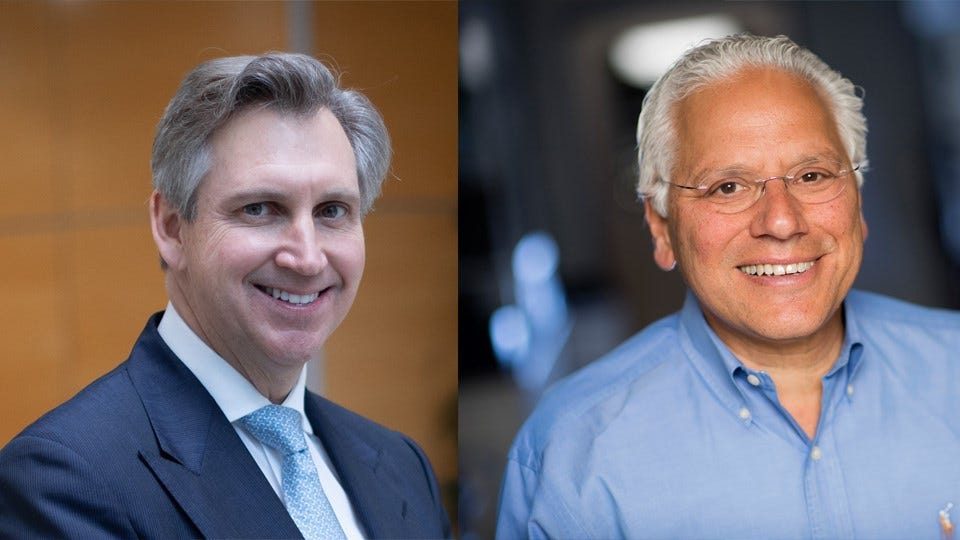$34M Expected to Grow DiMarchi ‘Family Tree’
 MBX President and Chief Executive Officer Kent Hawryluk (left) and MBX co-founder and Chief Scientific Officer Dr. Richard DiMarchi (right)
MBX President and Chief Executive Officer Kent Hawryluk (left) and MBX co-founder and Chief Scientific Officer Dr. Richard DiMarchi (right)
Subscriber Benefit
As a subscriber you can listen to articles at work, in the car, or while you work out. Subscribe NowA life sciences legacy in Indiana is expected to help write the future for Carmel-based MBX Biosciences. The startup aims to be the next success story for the Hoosier state and one of its most well-respected visionaries, Dr. Richard DiMarchi. A fixture in the life sciences landscape, DiMarchi will guide MBX Biosciences as it marches toward plans that are “even grander” than its predecessors. Boosted by the recent closure of a $34.6 million Series A financing round, the startup says the next chapter in the DiMarchi storyline is well underway.
“Richard DiMarchi is a fixture in biotech. He’s long been a leader in the field, going back to his similar invention of Humalog at Eli Lilly and beyond,” says MBX President and Chief Executive Officer Kent Hawryluk. “His role in startup companies is quite celebrated; he was the founder of Ambrx, Marcadia, Assembly Pharmaceuticals, MB2 and Calibrium. All of those companies have had exits either by being acquired by pharmaceutical companies or by going public. I’m pleased to have been part of several of those companies with him.”
DiMarchi is co-founder and chief scientific officer of MBX, the most recent startup based on discoveries made at his laboratory at Indiana University, where he is also the Linda & Jack Gill Chair in Biomolecular Sciences. A pioneer for new treatments in diabetes and other metabolic disorders, his latest iteration focuses on rare endocrine diseases, sparking the creation of MBX in 2019. Hawryluk says MBX is built on “technology and expertise that have been employed successfully across multiple companies.”
Endocrine disorders are related to the endocrine glands of the body, which make hormones. The most common endocrine disease in the U.S. is diabetes, but Hawryluk says MBX will focus on rare endocrine diseases that are “completely open” and “haven’t recruited the interest of large pharma yet.” MBX is advancing a pre-clinical pipeline of drug candidates that represents a “next generation approach.”
“Typically endocrine diseases are treated using large and frequent doses of naturally occurring hormones in an attempt to restore homeostasis (stability) and appropriate endocrine function,” says Hawryluk. “We’re making chemical modifications to the native hormone to substantially improve the pharmaceutic properties of that molecule; we’re creating analogs of natural hormones. This really is a great therapeutic approach, because these are hormones that are well understood to have a certain physiological effect—an important one. So we’re improving upon nature by optimizing these peptides to make them drug-like.”
The startup says the recent funding boost of nearly $35 million is an important milestone and will help advance the drug candidates. The investment includes several Indiana players: Indiana Philanthropic Venture Fund (IU PhV), Indiana Seed Fund III (managed by BioCrossroads) and Twilight Venture Partners II, which DiMarchi and Hawryluk lead. Additionally, Hawryluk says lead investor Frazier Healthcare Partners, OrbiMed and New Enterprise Associates are “very well-known for their role in building leading biopharma companies.”
Hawryluk says IU also plays a pivotal role; MBX is partnering with the university—the birthplace of MBX’s technology—to sponsor the research. This is the same model that was used for Marcadia, which was sold to Roche for more than $500 million.
“I think MBX has an even grander vision. Marcadia was certainly a success story, and that resulted in a sale to Roche and pioneering the field of [science],” says Hawryluk. “But our vision for MBX is even grander. We hope to employ a considerable number of people in Indiana, stay around for a long time and deliver needed medicines to patients.”
Noting that biotech companies take “patience, perseverance and capital,” Hawryluk says MBX’s “very seasoned team” will be a distinct advantage. While the realization of MBX’s full potential is likely years away, life sciences leaders are hopeful the startup will be the next chapter in DiMarchi’s Indiana legacy.
Based on his experience with Marcadia, MB2 and now MBX, Hawryluk says Indiana is a great place to start and grow a biotech company.
Hawryluk says MBX’s peptide therapeutics, “in essence, improve upon nature.”
